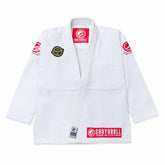Best Diet for BJJ Training: Keto vs Paleo vs Low-Carb Compared
In the world of Brazilian Jiu Jitsu (BJJ), strength, endurance, and recovery are key elements of peak performance. While technique is vital, what often separates a good grappler from a great one is nutrition. It does not matter whether you are training in a BJJ Gi or rolling in No-Gi. Your energy levels, mental sharpness, and physical resilience are deeply connected to the fuel you give your body. That’s where diet becomes crucial.
Among the most popular diets in the BJJ community today are Keto, Paleo, and Low-Carb. But which one is best for Brazilian Jiu Jitsu athletes? In this article, we break down these three eating strategies. We will compare their benefits, drawbacks, and overall impact on your BJJ training, competition, and recovery.
Why Diet Matters in Brazilian Jiu Jitsu
BJJ training is grueling. It does not matter if you are preparing for a tournament or attending daily sparring sessions. The sport demands cardiovascular endurance, explosive power, and sharp cognitive decision-making. A poorly structured diet can result in fatigue, poor performance, slower recovery, and even injury.
The goal of a solid BJJ diet is to:
- Optimize energy levels during training and rolling
- Enhance muscle recovery after workouts
- Reduce inflammation and soreness
- Improve mental clarity for strategic decisions during a match
- Support lean muscle development and body composition
Let’s now explore how Keto, Paleo, and Low-Carb diets align with these goals.
The Keto Diet for BJJ
What Is It?
The Ketogenic Diet is a high-fat, moderate-protein, very low-carbohydrate eating plan. It forces the body into a metabolic state called ketosis, where it burns fat for energy instead of glucose.
- Fat: 70–80%
- Protein: 15–20%
- Carbs: 5–10% (usually under 50g/day)
Pros for BJJ Practitioners
- Fat Adaptation: Once fully adapted, many BJJ athletes report more stable energy levels during long training sessions.
- Weight Management: Helps with cutting weight for competitions while maintaining muscle mass.
- Mental Clarity: Keto is known for reducing brain fog and boosting focus during rolls.
- Inflammation Control: The diet may reduce inflammation. Thus, it is beneficial for recovery and joint health in BJJ athletes.
Cons
- Adaptation Period: The first few weeks can be rough—low energy, sluggishness, and irritability are common.
- Explosive Power Loss: For BJJ styles that require quick bursts (like takedowns), the lack of glycogen may impact performance.
- Social Inflexibility: Difficult to maintain at events or while traveling for tournaments.
Verdict
The Keto Diet is great for BJJ practitioners who want better energy efficiency, mental sharpness, and fat loss. It is especially effective during off-seasons or for athletes recovering from injuries. However, it may not be ideal for high-intensity sparring or competition weeks.
Read detailed guide > Keto Diet for BJJ: Benefits, Risks, and Performance Impact
The Paleo Diet for BJJ
What Is It?
The Paleo Diet mimics what our ancient ancestors might have eaten. It focuses on whole foods. It includes lean proteins, vegetables, fruits, nuts, and seeds, while eliminating processed foods, grains, dairy, and legumes.
- Protein: High (meat, fish, eggs)
- Carbs: Moderate (vegetables, fruits)
- Fat: Moderate (nuts, seeds, oils)
Pros for BJJ Athletes
- Clean Eating: Encourages nutrient-dense, anti-inflammatory foods that support muscle recovery.
- Improved Digestion: Removing processed foods and grains often reduces bloating and gut issues.
- Flexible Carbs: Allows for a natural amount of carbs to fuel high-intensity Gi and No-Gi BJJ sessions.
- Muscle Growth: High-quality protein intake aids in muscle repair and growth.
Cons
- Restrictive: Eliminating grains, dairy, and legumes can be hard long-term.
- Expensive: High-quality meat and organic produce can raise your grocery bill.
- Varying Results: Carbohydrate intake can vary, which might confuse those aiming for a consistent energy strategy.
Verdict
The Paleo Diet is excellent for those seeking a natural, anti-inflammatory eating approach that still supports high-energy grappling. It offers a good middle ground for BJJ athletes who want to avoid processed carbs without fully cutting them out.
Low-Carb Diet for BJJ
What Is It?
The Low-Carb Diet limits carbohydrate intake (generally below 150g/day). But it is more flexible than Keto. You still eat some carbs—particularly around workouts—while emphasizing protein and healthy fats.
- Carbs: 50–150g/day (timed around training)
- Protein: Moderate to High
- Fat: Moderate
Pros for Jiu-Jitsu Athletes
- Energy Control: Reduces carb crashes while still supplying glycogen for intense BJJ sparring.
- Weight Loss Friendly: Helps manage body fat without extreme restriction.
- Easier to Maintain: More sustainable than Keto or Paleo, especially in social settings or travel.
- Carb Timing: Allows strategic carb consumption before or after training for explosive power and faster recovery.
Cons
- Trial and Error: Finding the right balance of carbs can take time.
- Lack of Structure: Unlike Keto and Paleo, this diet may lack strict guidelines, which some athletes find confusing.
- Not Ideal for Bulking: Those trying to gain muscle may need more carbs than this diet allows.
Verdict
A Low-Carb Diet is great for BJJ athletes seeking flexibility without sacrificing energy or weight goals. It is often the easiest to stick with while still offering benefits for body composition, recovery, and stamina.
Keto vs Paleo vs Low-Carb: Which Diet Wins for BJJ?
| Factor | Keto | Paleo | Low-Carb |
|---|---|---|---|
| Energy for Rolling | Moderate | High | High |
| Recovery Support | Moderate | High | Moderate to High |
| Weight Management | Excellent | Good | Good |
| Muscle Building | Moderate | High | Moderate to High |
| Ease of Maintenance | Difficult | Moderate | Easy |
| Ideal For | Off-season or fat loss | Clean eating, moderate carbs | Everyday training and prep |
Ultimately, there is no one-size-fits-all answer. The best diet for BJJ is the one that matches your training intensity, competition goals, body type, and personal preferences.
Pro Tips for BJJ Athletes on Any Diet
Regardless of the plan you choose, keep these tips in mind:
- Stay Hydrated: Especially important for Keto due to water loss.
- Prioritize Sleep: Your diet works best when combined with recovery.
- Supplement Smartly: Consider electrolytes, omega-3s, magnesium, or creatine depending on your diet and training volume.
- Track Your Macros: Apps like MyFitnessPal can help monitor your carb intake, protein goals, and caloric balance.
- Listen to Your Body: If your performance drops, adjust your intake. BJJ is demanding, and your fuel should reflect that.
Final Thoughts: Fuel Your Roll
It does not matter whether you are training in a Gi, competing in No-Gi tournaments, or rolling casually at your local BJJ academy. Nutrition is your secret weapon. Keto might be great for long-term fat adaptation and mental clarity. However, Paleo is good for whole-food performance and recovery. And Low-Carb are great for flexible energy management. Don’t just eat to stay full—eat to dominate the mat.
For long-term success in Brazilian Jiu Jitsu, your diet should be as strategic and disciplined as your guard game. Test what works, track your results, and evolve with your goals.







